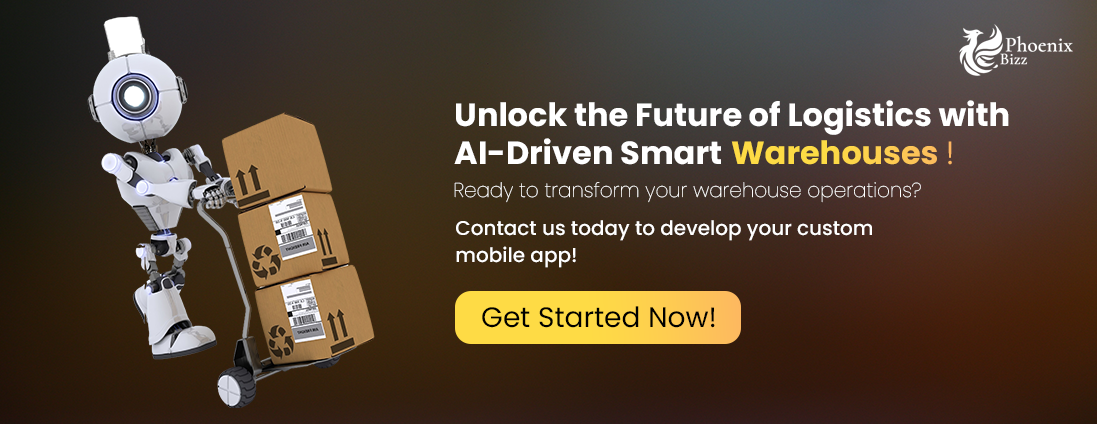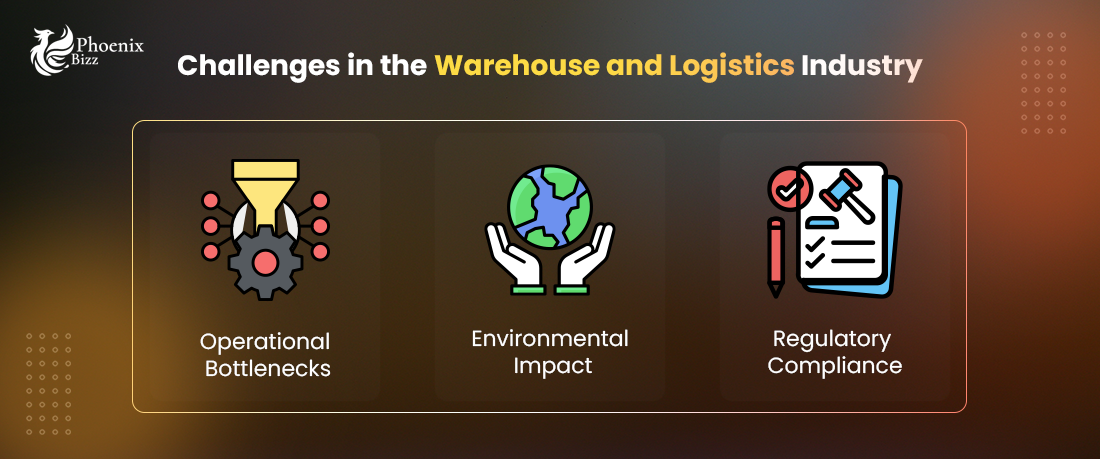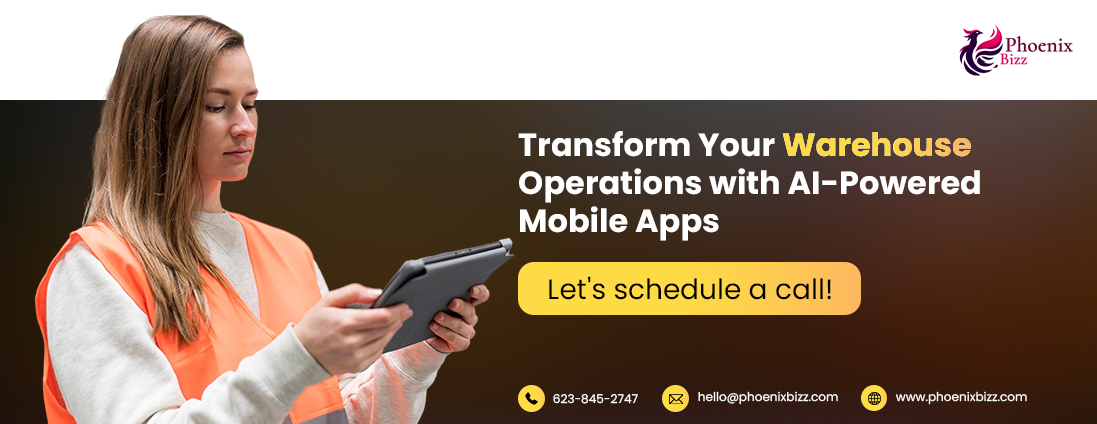August 06, 2024
By: PhoenixBizz Staff Writer
PhoenixBizz is a division of Sofvue, LLC
Printed with permission of Data Titan and Sofvue LLC
Operating logistics is a challenging task, but it is crucial for supply chain management. Traditional methods of logistics planning, storage, and inventory management are time-consuming. So, what is the solution? Warehouses can adopt a smarter approach by using AI-driven mobile apps to handle both simple and complex tasks. AI in warehouse management is becoming increasingly popular.
Artificial intelligence is everywhere, and companies are utilizing this technology for building and expanding businesses. Per Forbes, the global artificial intelligence market is expected to reach $1811.8 billion by 2030. These figures clearly show the impact AI is having on various industries. Given the challenges logistics managers face, investing in AI-powered mobile app development is an excellent option. Let's explore how smart warehouses and mobile apps use AI to enhance logistic management.
About AI Mobile Apps for Warehouses
Warehouses undergo numerous operations to ensure products safely reach their destination from inventory. Close coordination is essential for timely transportation. All goods and products are stored in warehouses, where the journey from pickup to delivery begins. Most tasks in warehouses are handled by professionals. From supply chain management to logistics management, warehouses are central to these functions.
AI-powered mobile apps can transform these spaces into smart warehouses, where automation simplifies most tasks. These apps help track, monitor, and manage inventory levels and transportation. They also assist with demand forecasting and send alerts to the relevant departments. Using a mobile app for warehouse operations saves time and streamlines the workflow.
Challenges in the Warehouse and Logistics Industry
1. Operational Bottlenecks
Equipment downtime and unexpected obstacles can arise at any time, leading to delays in transportation and warehousing that affect business operations. Mobile apps can utilize real-time data to predict equipment failures or stock shortages, ensuring timely deliveries.
2. Environmental Impact
Inventory management, distribution centers, and transport activities contribute to environmental pollution through high energy consumption, waste generation, and greenhouse gas emissions. These activities degrade air quality and contribute to climate change. Companies should embrace sustainable practices. AI-powered mobile apps can monitor energy consumption patterns, identify efficient routes for vehicles to reduce fuel consumption, and oversee waste handling processes in real time. These self-controlling and informative apps help businesses adopt environmentally friendly practices and minimize environmental impacts.
3. Regulatory Compliance
Complying with numerous rules and regulations to protect workers, the environment, and data is a continuous and complex challenge in the warehousing and logistics field. Non-compliance can result in sanctions, penalties, legal violations, and damage to a company's reputation. Mobile apps help reduce regulatory risks by providing notifications about regulatory changes, managing documentation, and conducting compliance checks. These apps also track and report safety performance, ensuring that each procedure complies with established guidelines or rules to avoid non-compliance risks.
Primary Benefits of Using AI Mobile Apps for Logistics Management
Warehousing companies are actively investing in AI-powered logistics apps for numerous advantages offered. They save time and increase operational efficiency, leading to positive results. These apps also minimize the chances of stockouts and overstocking by closely monitoring the inventory levels.
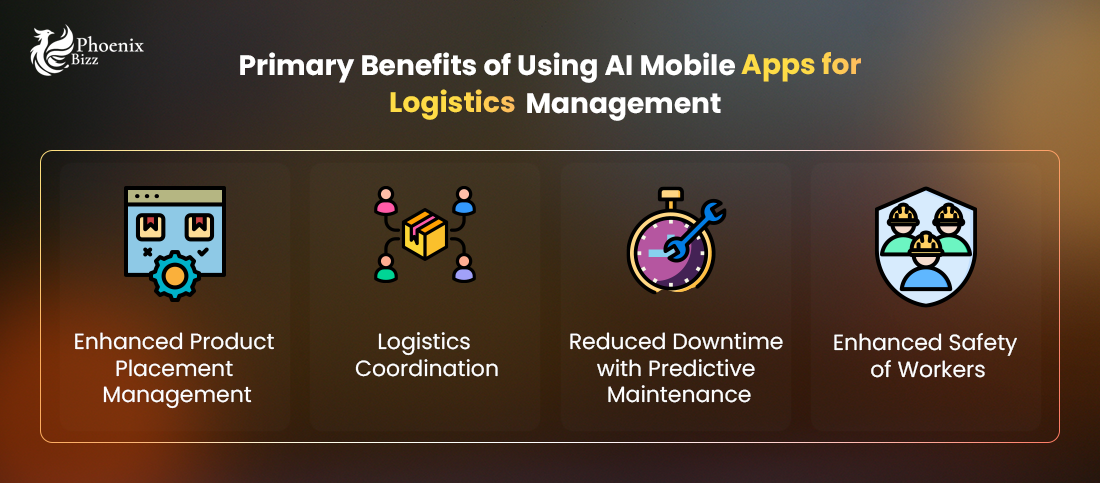
1. Enhanced Product Placement Management
Mobile AI applications significantly improve the management of product placement in warehouses compared to conventional methods by fully utilizing computational algorithms and real-time analytics. These apps consider parameters like product demand, employee productivity, and space utilization to suggest the optimal placement for products. This reduces the time wasted searching for individual items and maximizes the use of available space, ensuring the warehouse operates at its full potential. Some of these apps also feature tracking capabilities that show the status of products in real-time, making stock management easier and more convenient. This saves workers time spent locating materials or equipment, thereby improving workflow efficiency.
2. Logistics Coordination
AI mobile applications are highly effective in enhancing distribution coordination for warehousing and logistics organizations. These apps integrate various inputs such as shipment plans, transportation maps, and real-time traffic data to improve delivery strategies. Using big data, AI can identify the best routes for delivering goods, avoiding high-traffic areas to minimize fuel consumption and optimize delivery times. These apps enable different supply chain members, including warehouse personnel and delivery drivers, to stay informed about any changes or delays in orders. This real-time coordination helps avoid congestion and ensures a smooth logistics flow.
3. Reduced Downtime with Predictive Maintenance
Companies often lose business due to equipment and operational downtime, which can be avoided using predictive analytics features in mobile apps. By analyzing real-time data with artificial intelligence, these apps can predict and schedule maintenance for equipment and machinery, ensuring continuous operations. This proactive approach saves warehousing companies from the financial losses associated with unscheduled downtime.
4. Enhanced Safety of Workers
Warehouses are challenging environments, with workers performing demanding physical tasks for long hours. Ensuring their safety is a top priority. AI-driven mobile apps can send timely alerts and warnings to assigned authorities and medical staff in case of accidents. Additionally, these apps ensure that all equipment is in proper working condition, minimizing the chances of incidents. Workers can also access training programs through the app for added security.
Top AI Mobile App Features to Consider for Smart Warehouses
Mobile apps developed with the power of artificial intelligence help companies better control their warehouses and supply chain. They facilitate improved collaboration with suppliers, leading to satisfied clients and customers. However, your app must have the right features and specifications to build that loyalty. Here is a list of some essential features to add to the mobile app for smart management:
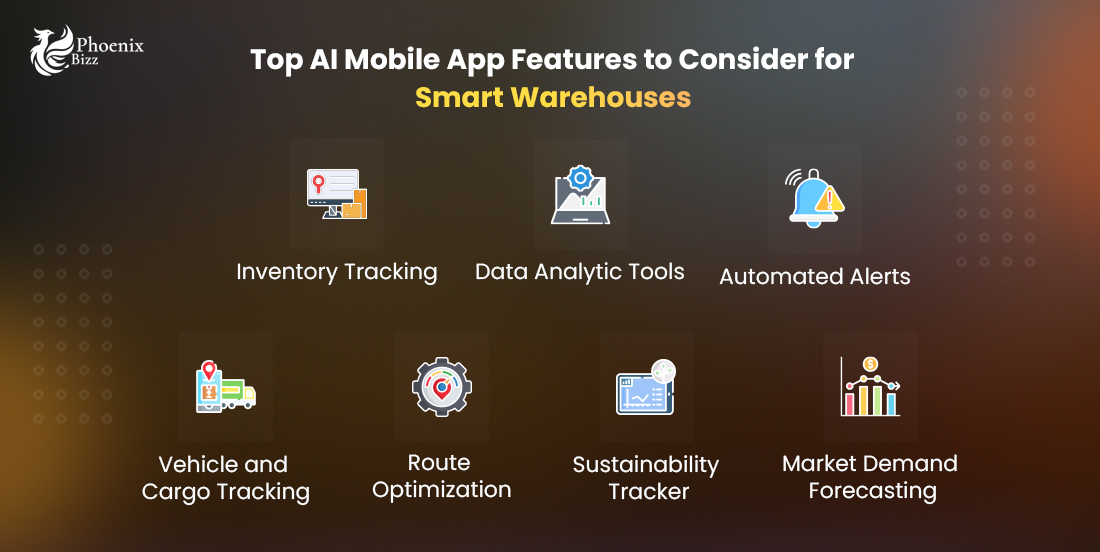
#1. Inventory Tracking
Keep a strong check on inventory levels with the help of an AI-driven mobile app that closely monitors inventory. This feature alerts the concerned department in case of stockouts or overstocking, saving the company substantial losses.
#2. Data Analytic Tools
Inbuilt data analytics tools help study warehousing operations. Based on insights, the team can implement new strategies and enhance existing ones. Analyzing essential information on supply chain, logistics, transportation, and other similar factors assists in making the right decisions.
#3. Automated Alerts
Warehouses are full of heavy machinery and equipment, posing risks of fatal accidents. An AI-enabled mobile app connected to sensors in the warehouse can send timely alerts to security personnel whenever an accident occurs. This also helps in maintaining security compliances, saving the warehouse from penalties and legal trouble.
#4. Vehicle and Cargo Tracking
With the help of artificial intelligence, managers can precisely track delivery vehicles. The technology provides real-time updates even in remote areas with low connectivity.
#5. Route Optimization
AI studies the selected delivery route and offers useful suggestions to the driver, considering factors like traffic, weather, and road conditions. This leads to quicker and safer deliveries. The app examines fuel consumption and driving patterns to reduce costs and minimize the chances of accidents due to reckless driving.
#6. Sustainability Tracker
Companies today search for diverse ways to achieve sustainability. A mobile app fused with artificial intelligence can suggest methods to reduce the company's carbon footprint and emissions. It helps create sustainability goals and provides suggestions to achieve them, allowing you to track progress through the app.
#7. Market Demand Forecasting
Analytic tools help warehouse staff study market trends and demands. This crucial information ensures that you meet client and customer demands even in unpredictable market conditions.
You may also like to read: Maximizing Efficiency: Utilizing Logistics Software to Streamline Inventory, Order Processing, and Shipping for Small Businesses
Factors to Consider While Developing an AI Mobile App for Warehouses
While artificial intelligence is a powerful tech advancement, it needs to be carefully utilized. Warehouse companies can use their full potential by developing a cutting-edge mobile app. Here is what you need to consider during the development process:
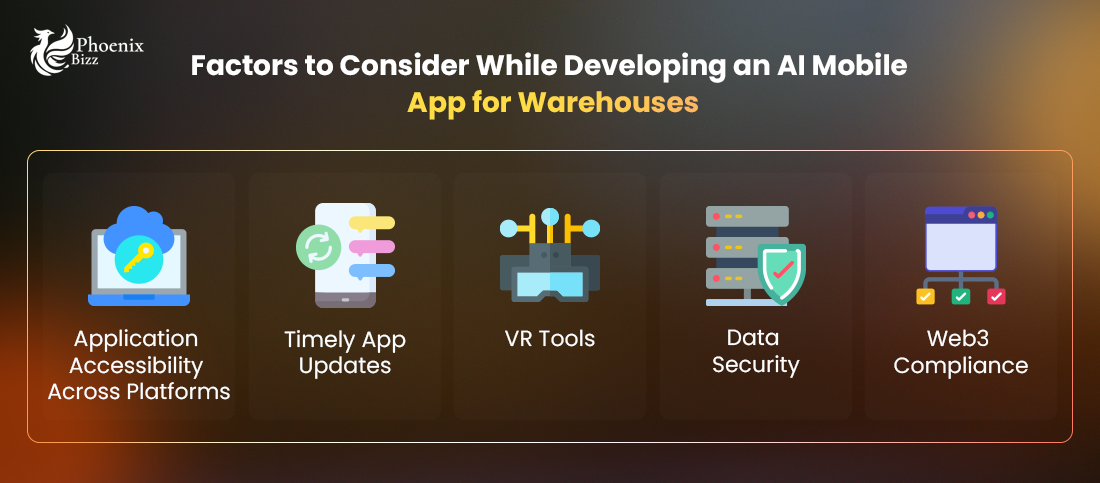
1. Application Accessibility Across Platforms
Warehouse employees and workers use both iOS and Android phones, so developing an app that works seamlessly on both platforms is essential. Ensure your AI app for smart warehouses is accessible on different platforms to provide quick and easy access for all workers.
2. Timely App Updates
The AI mobile app should receive timely updates to ensure smooth warehouse automation. These updates act as energy boosters for the app, enabling it to use machine learning algorithms and real-time data to deliver optimal performance. Regular updates help the app run without glitches, reduce manual operations, and maximize operational efficiency.
3. VR Tools
Introducing virtual reality (VR) to your warehouse management app makes it more immersive and productive. Inventory managers can virtually monitor inventory and navigate the warehouse without physically being present. Ensure the app development company you hire can incorporate VR technology into the app.
4. Data Security
A large amount of data is stored and processed within the warehouse mobile app. The communication channels should be 100% encrypted to prevent data theft and phishing attacks. Discuss with the developer various ways to ensure the safety of confidential data and warehouse business details.
5. Web3 Compliance
The app should comply with the standards required for smooth functioning on Web3. This includes adopting SEO strategies, data permissions for users, blockchain coding, and more. Maintaining these principles enhances the app's visibility, leading to quick access for workers.
Check out our fetured project: Blue Jay Logistics
Conclusion
Warehouse Management has been revolutionizing industries for decades, and with recent developments with AI over the past decade, the revolution is happening faster, but not every business owner embraces it, leading to slower operations and significant downtime. As a result, warehouse managers can transform their traditional warehouses into smart ones by investing in an AI-driven mobile app.
PhoenixBizz, a division of Sofvue LLC, and Data Titan, excels in developing high-end custom mobile apps for diverse businesses. From adding unique features to ensuring data security, we leverage the latest technology to deliver impressive results. Client satisfaction is our single focus, so feel free to contact our support team at 623-845-2747 and ask to talk with an architect or project owner so we can learn more about how we can help.
RE: 11828
Citations:
Forbes: https://www.forbes.com/advisor/in/business/ai-statistics/
